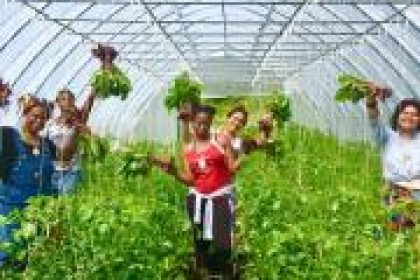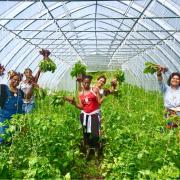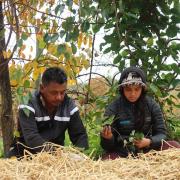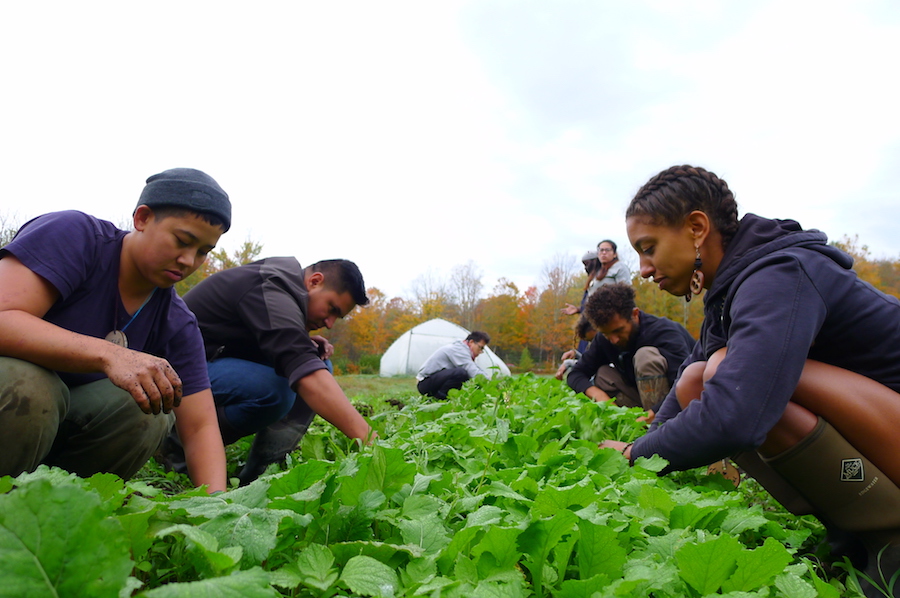
Our food system is built on stolen land and exploited labor. Here’s what we can do to fix it.
Guest blog by Leah Penniman of Soul Fire Farm in Grafton, New York.
Racism is built into the DNA of the United States’ food system. It began with the genocidal theft of land from First Nations people, and continued with the kidnapping of my ancestors from the shores of West Africa. Under the brutality of the whip and the devastation of broken families, enslaved Africans cultivated the tobacco and cotton that made America wealthy.
 But the story doesn’t end with the Emancipation Proclamation. Later came convict leasing, a form of legalized slavery that kept many Southern black people on plantations—in some places until the late 1920s. Just a few decades later, Congress created the migrant guest-worker program, which imported agriculturalists from Mexico and other countries to labor in the fields for low wages.
But the story doesn’t end with the Emancipation Proclamation. Later came convict leasing, a form of legalized slavery that kept many Southern black people on plantations—in some places until the late 1920s. Just a few decades later, Congress created the migrant guest-worker program, which imported agriculturalists from Mexico and other countries to labor in the fields for low wages.
All of this history combines to produce the racism I see today in my work as a farmer and activist for food justice. Farm management is among the whitest professions, while farm labor is predominantly brown and exploited. Meanwhile, people of color tend to suffer from diet-related illnesses such as diabetes and obesity, and to live in “food apartheid” neighborhoods—high-poverty areas flooded with fast food and corner stores, but lacking healthy food options. While some writers refer to these areas as “food deserts,” I prefer the term “food apartheid” because this is a human-created system of segregation, not a natural ecosystem.
Our food system needs a redesign if it’s to feed us without perpetuating racism and oppression.
Just as our ancestral mothers braided seeds of rice and okra into their hair before boarding slave ships, believing in a future of harvest in the face of brutality, so must we maintain courage and hope in these terrifying times.
As we work toward a racially just food system, abandoning the “colonizer” mentality that first created the problems is crucial. The communities at the frontlines of food justice are composed of black, Latinx, and indigenous people, refugees and immigrants, and people criminalized by the penal system. We need to listen before we speak and follow the lead of those directly affected by the issues. Here are three things BIPOC (Black-Indigenous-People-of-Color) farmers are asking us to do.
ONE. FARMWORKER JUSTICE
 Over ¾ of our food is grown by workers who were foreign born, predominantly Latinx or Hispanic. Yet, only 3% of farms have Latinx or Hispanic managers. Farmworkers are excluded from many protections under the National Labor Relations Act (NLRA) and Fair Labor Standards Act (FLSA) such as collective bargaining rights, overtime limits, child labor restrictions, and workers compensation insurance. Many farmworkers receive wages based on “piece-rate,” e.g. 85 cents per 90 pound box of oranges. This practice results in ⅓ of farmworkers earning below minimum wage. Large corporations now control 50% of the food production in this country and push to keep farm labor cheap for maximize profits.
Over ¾ of our food is grown by workers who were foreign born, predominantly Latinx or Hispanic. Yet, only 3% of farms have Latinx or Hispanic managers. Farmworkers are excluded from many protections under the National Labor Relations Act (NLRA) and Fair Labor Standards Act (FLSA) such as collective bargaining rights, overtime limits, child labor restrictions, and workers compensation insurance. Many farmworkers receive wages based on “piece-rate,” e.g. 85 cents per 90 pound box of oranges. This practice results in ⅓ of farmworkers earning below minimum wage. Large corporations now control 50% of the food production in this country and push to keep farm labor cheap for maximize profits.
What can we do? Support the Fairness for Farmworkers Act of 2019. The people who feed our families deserve full protection under NLRA and FLSA, including a living wage, safe housing and transportation, breaks, overtime pay, workers comp and unemployment insurance, protection from pesticide exposure, and the right to collectively bargain.
TWO. LAND AND RESOURCE REDISTRIBUTION
Europeans colonizers seized 1.5 billion acres of land from Native Americans and the United Nations says that the U.S. should give it back. African Americans are also victim to land grabbing. In 1920, 14% of all land owning U.S. farmers were black and today less than 2% of farms are controlled by black people, a loss of over 14 million acres. In 1982, the US Commission on Civil Rights determined that discrimination from the United States Department of Agriculture (USDA) was the primary reason black farmers were dispossessed from our land. The growing disparities between white and black people in land ownership in this country mirror the widening wealth gap, which has increased from 8:1 in 2010 to 13:1 in 2013. Ralph Paige of the Federation of Southern Cooperatives put it simply, “Land is the only real wealth in this country and if we don’t own any we’ll be out of the picture.”
What can we do? Contribute to the BIPOC-led land trust work of the National Black Food and Justice Alliance, Southeastern African American Farmers’ Organic Network, and the Northeast Farmers of Color Land Trust. Support BIPOC farmers in your area by purchasing their products and offering to volunteer your time.
THREE. FOOD ACCESS WITH DIGNITY
 About 50 million Americans are food insecure, with half of those individuals living in food deserts, where it’s difficult or impossible to access affordable, healthy food. This trend is not race neutral. White neighborhoods have an average of four times as many supermarkets as predominantly black communities. This lack of access to life-giving food has dire consequences for our communities. The incidence of diabetes, obesity, and heart disease are on the rise in all populations, but the greatest increases have occurred among people of color, especially black and indigenous people. These illnesses are fueled by diets high in unhealthy fats, cholesterol, and refined sugars, and low in fresh fruits, vegetables, and legumes. In our communities children are being raised on processed foods, and now over one-third of children are overweight or obese, a fourfold increase over the past 30 years. This puts the next generation at risk for lifelong chronic health conditions, including several types of cancer.
About 50 million Americans are food insecure, with half of those individuals living in food deserts, where it’s difficult or impossible to access affordable, healthy food. This trend is not race neutral. White neighborhoods have an average of four times as many supermarkets as predominantly black communities. This lack of access to life-giving food has dire consequences for our communities. The incidence of diabetes, obesity, and heart disease are on the rise in all populations, but the greatest increases have occurred among people of color, especially black and indigenous people. These illnesses are fueled by diets high in unhealthy fats, cholesterol, and refined sugars, and low in fresh fruits, vegetables, and legumes. In our communities children are being raised on processed foods, and now over one-third of children are overweight or obese, a fourfold increase over the past 30 years. This puts the next generation at risk for lifelong chronic health conditions, including several types of cancer.
What can we do? Healthy food is a basic human right, not a privilege to be reserved for the wealthy. To honor this right, we need to resist the administration’s attempts to eviscerate the Supplemental Nutrition Assistance Program (SNAP).
***
For a complete list of action steps toward a just and equitable food system, check out Soul Fire Farm’s platform. If we are not acting to change the system, we are complicit, casting our silent vote to maintain the status quo.
_________________________________________________________________________________
Leah Penniman is a Black Kreyol farmer, author, mother, and food justice activist who has been tending the soil and organizing for an anti-racist food system for over 20 years. She currently serves as founding co-executive director of Soul Fire Farm in Grafton, New York, a people-of-color led project that works toward food and land justice. Her new book isFarming While Black: Soul Fire Farm’s Practical Guide to Liberation on the Land. Find out more about Leah’s work atwww.soulfirefarm.org and follow her @soulfirefarm on Facebook, Twitter and Instagram.




